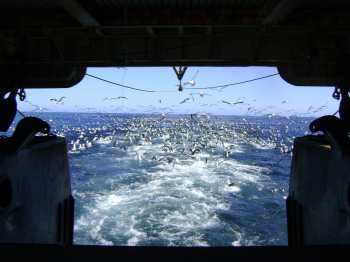BirdLife International's Global Seabird Programme has been active of late in both Namibia and South Africa.
Popular South African music band Freshlyground offered a "flashmob style performance" at Cape Town's trendy V&A Waterfront in the city docks area in support of BirdLife South Africa's Save our Seabirds Festival held last month (click here for the video clip). Freshlyground is a South African Afro-fusion band formed in 2002.
The Festival tackled the issues of overfishing, pollution and habitat loss and also listened to a lecture on seabird island restoration by the distinguished Chair of BirdLife International's Global Seabird Programme (and retired British Antarctic Survey albatross researcher), Professor John Croxall, CBE, FRS.
The top 50 finalists' photos from the Oceans of Life photographic competition held as part of the Festival are on display at the Iziko South African Museum, Cape Town until 20 November 2011.

Albatrosses behind a demersal trawler
Photograph by Neil Anders
News from the Albatross Task Force (part of the Global Seabird Programme) in Namibia reveals progress with the Namibian National Plan of Action - Seabirds which has been through various drafts since 2003. In June this year a workshop was held with key fisheries scientists and government officials to finalise the latest draft for presentation to (and hopefully adoption by) the Namibian Minister of Fisheries. "This document is the roadmap for seabird bycatch mitigation in Namibia and will pave the way for legislation to reduce incidental seabird bycatch". See also http://www.nnf.org.na/NNF_news/20110707_news.htm.
ATF-Namibia has been conducting trials on demersal trawlers to demonstrate the effectiveness of bird-scaring lines at preventing bird interactions with fishing gear. The results of this work will hopefully form the basis for developing best-practice mitigation guidelines for the hake Merluccius spp. trawl fishery in Namibian waters.
John Cooper, ACAP Information Officer, 14 November 2011

 Français
Français  English
English  Español
Español